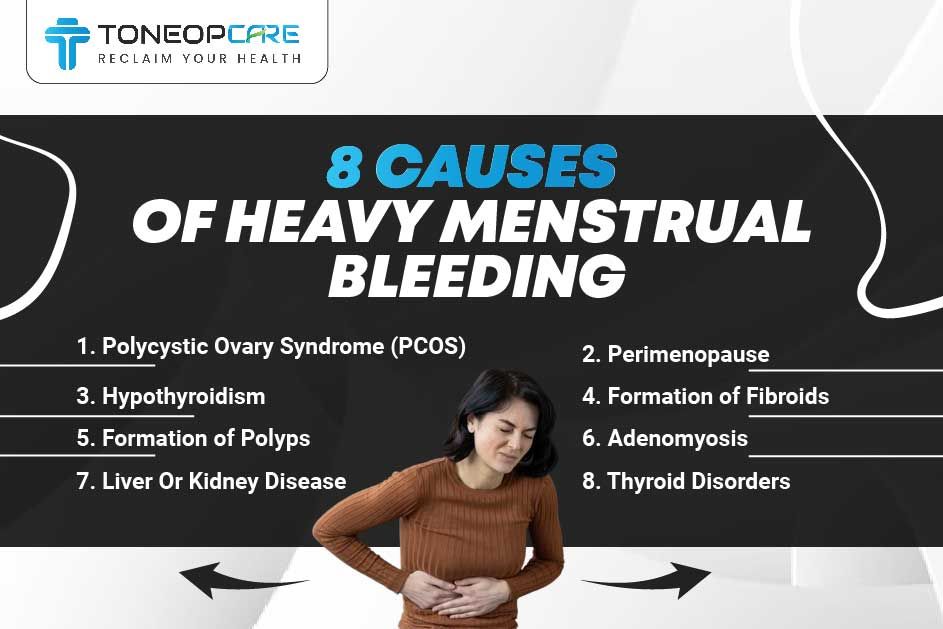We assure you that you won’t be alone on your journey towards becoming your healthier self.
Women Wellness
What Causes Heavy Menstrual Bleeding In Women? Know 8 Reasons Here!

Are heavy periods affecting more women than we realise? It's surprising to learn that the global prevalence of heavy menstrual bleeding varies significantly depending on the region and how it's measured. Did you know that in America, the prevalence of heavy menstrual bleeding is reported to be 38.9%, while in developing countries, it ranges from 8% to 27%?
Despite heavy menstrual bleeding not being directly linked to mortality, it can cause significant morbidity due to conditions like anaemia. Therefore, it is essential to understand the major causes of heavy menstrual bleeding to prevent any possible side effects. Read on to know more!
Table Of Contents
- 8 Causes Of Heavy Menstrual Bleeding
- Expert’s Advice
- The Final Say
- FAQs
- References
8 Causes Of Heavy Menstrual Bleeding

Excessive menstrual bleeding, known as menorrhagia, can be caused by menstrual problems. This means losing more than 80 millilitres of blood per cycle or having a period that lasts longer than 7 days. So, what causes heavy periods? There are several reasons why women experience heavy menstrual bleeding:
1. Polycystic Ovary Syndrome (PCOS)
PCOS is a hormonal problem that causes small cysts to form on the ovaries. It is one of the main reasons for heavy menstrual bleeding. This can lead to irregular periods, extra male hormones in the body, and difficulties getting pregnant. These hormone imbalances can also affect the uterus lining, causing heavy periods.
Also Read: How To Control Mood Swings During Periods?
2. Perimenopause
Another big reason for heavy menstrual bleeding is perimenopause. It is a condition when your body prepares for a natural transition, leading to menopause, thus marking the end of the reproductive cycle. During this phase, the ovaries produce estrogen and progesterone, causing the uterine lining to grow and cause heavy bleeding in some cycles.
3. Hypothyroidism
An underactive thyroid gland (hypothyroidism) can disrupt the balance of growth hormones. Thyroid hormones interfere with hormone production, and imbalances can affect menstrual flow and irregularity. Women with hypothyroidism often bleed heavier and longer.
4. Formation of Fibroids
Uterine fibroids are non-cancerous tumours found in the uterus that may vary in size and number. They consist of muscle and fibre tissue that bends the uterine cavity and expands the inner surface of the uterus, causing heavy bleeding. Large fibroids can also affect the bladder and other organs, causing other symptoms such as abdominal pain and frequent urination.
Also Read: Top 10 Benefits of HPMC Capsules For Health And Well-Being!
5. Formation of Polyps
Endometrial polyps are non-cancerous growths that stick to the lining of the uterus. They are made up of too much tissue from the lining and can be small or large. These polyps can cause problems with the uterus lining, leading to heavy or long-lasting periods.
6. Adenomyosis
Adenomyosis is a condition where tissue that normally lines the inside of the uterus starts to grow into the muscle wall of the uterus. This can make the uterus bigger and lead to heavy and painful periods. We're not sure what causes adenomyosis, but it seems to be connected to estrogen levels and most often affects women in their 30s and 40s.
Also Read: Here Are The Top 5 Signs Your Daughter Is About To Start Her Period!
7. Liver Or Kidney Disease
The liver and kidneys are important in hormonal regulation and blood clotting. Liver disease can cause hormone deficiency and decreased blood clotting, causing menstrual irregularities. Likewise, kidney disease affects the regulation of hormones and blood pressure, directly affecting the menstrual period.
8. Thyroid Disorders
Both hyperthyroidism (hyperthyroidism) and hypothyroidism (hypothyroidism) can affect menstruation. Hypothyroidism can cause severe bleeding. Conversely, hyperthyroidism can be mild or weak but can sometimes cause heavy bleeding due to hormonal imbalance.
Expert’s Advice
As a health expert, I recommend focusing on a healthy diet rich in iron, vitamin C, and omega-3 fatty acids. Not only this, but you can also opt for natural supplements like Period Care 360. It is 100% safe and is infused with natural hing oil, Coconut and Frankincense Oil. It can help control mood swings, cramps, bloating, etc.
Remember to stay hydrated to control heavy menstrual bleeding. Also, try to avoid excessive caffeine and salt. Not only this but consider taking a multivitamin with iron after consulting your doctor.
Health Expert
Akshata Gandevikar
The Final Say
Well, menorrhagia, which is heavy menstrual bleeding, is a common but often overlooked condition that can greatly impact a woman's life. It's important to understand the cause and find the right treatment to improve quality of life. Whether it's through medical treatments, lifestyle changes, or support from others, women dealing with heavy menstrual bleeding can find ways to live better lives.
If you or someone you know is experiencing this, it's important to seek medical help right away and explore the many available options for care and treatment.


